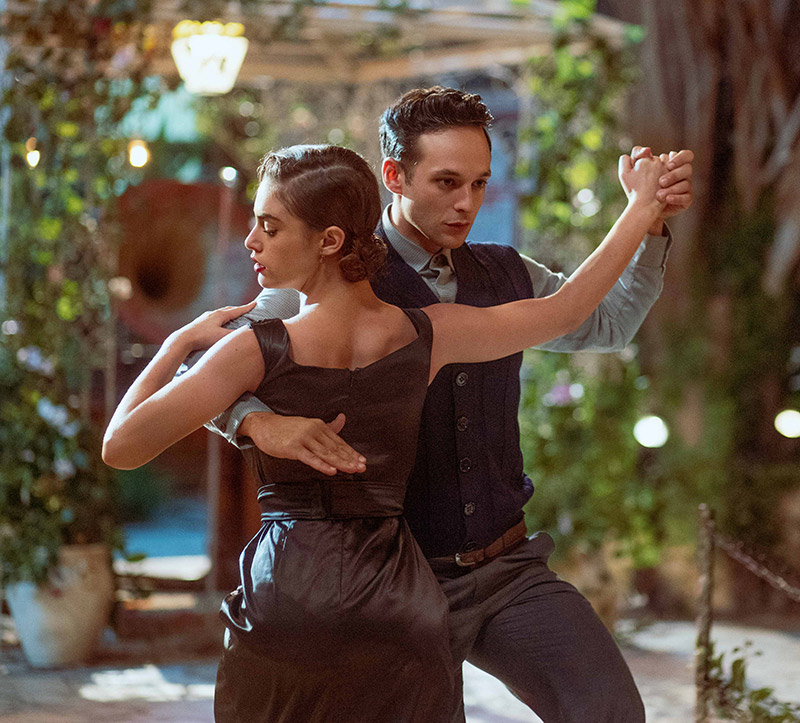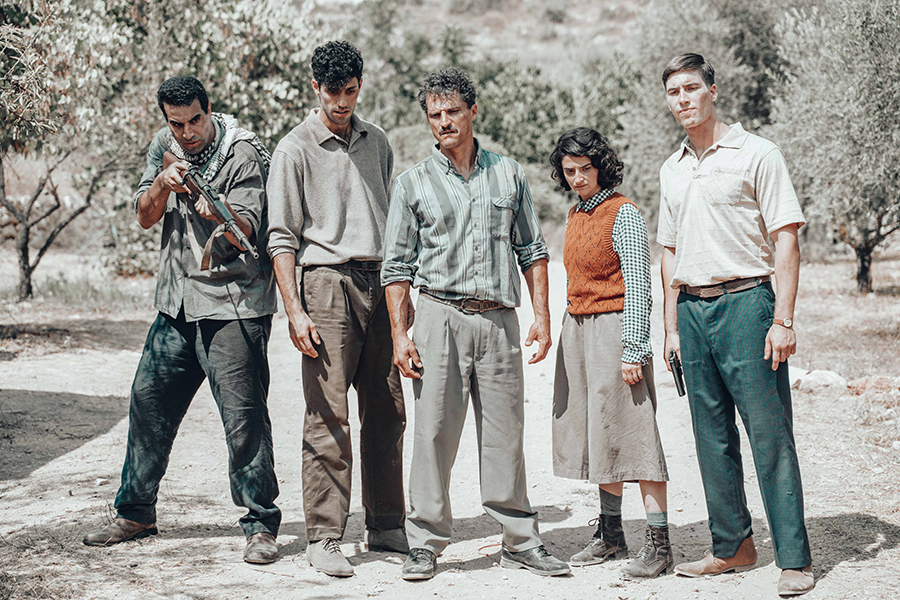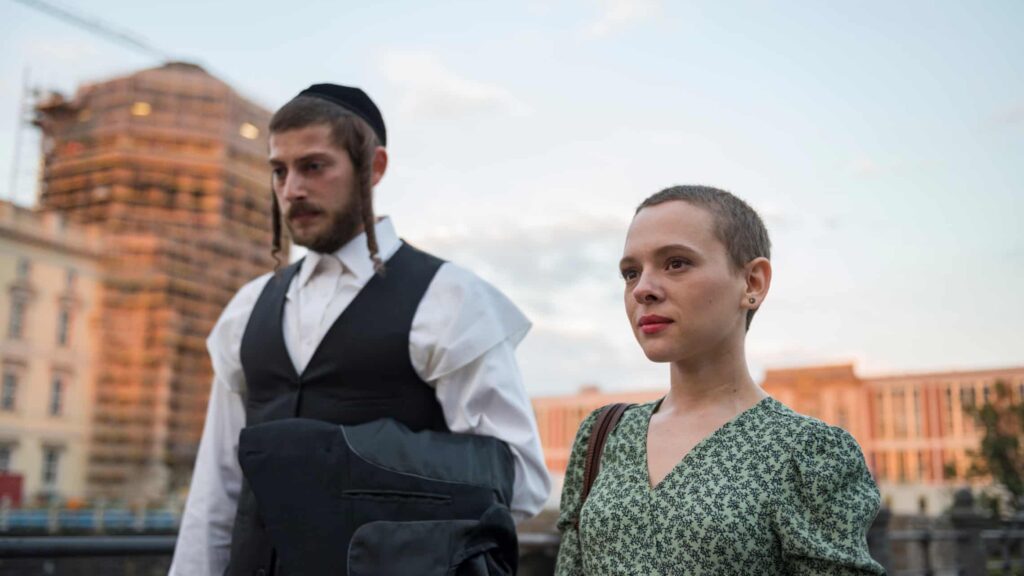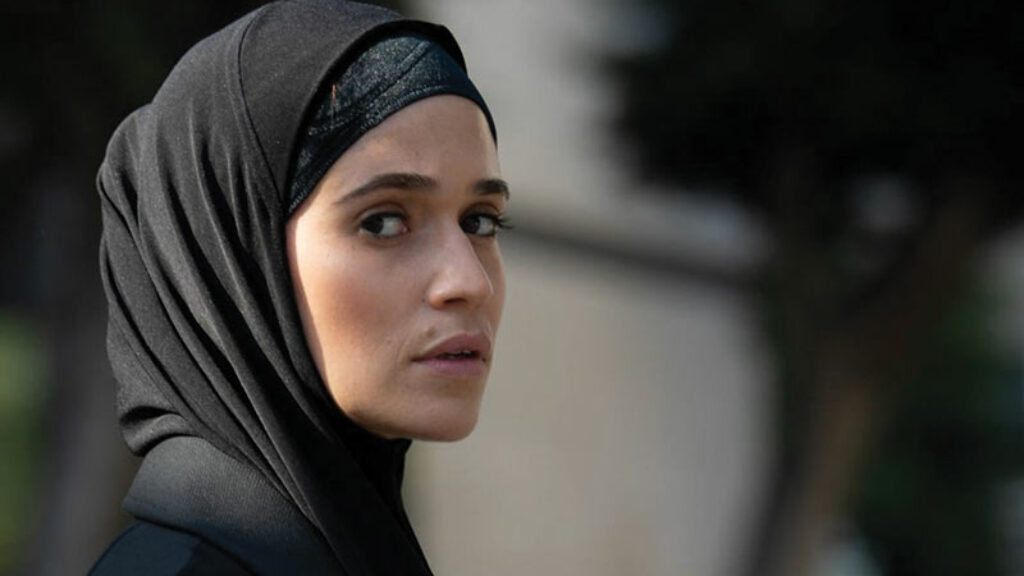Sephardi Soap
The first thing one notices in the opening scenes of The Beauty Queen of Jerusalem, Israel’s first major costume drama, is the sheen of the photographic filter; the second is the striking looks of the actors; the third is the lovely setting (which, for logistical reasons, is the Galilean town of Safed dressed up as the Holy City) and magnificent outfits; the fourth is the animated orchestra of Spanish guitars, jazzy horns, and Middle Eastern percussion that plays appropriately diverse background music for the lively multilingual dialogue; and the fifth is the show’s unrelenting melodrama, which drenches all this beauty in a soapy film matching, so it seems, the gauzy glow of the camera filter.
The Beauty Queen of Jerusalem is based on an Israeli novel of the same name by the journalist Sarit Yishai-Levi that tells the multigenerational tale of a family cursed by loveless marriages. Early in the story, an elder explains to the youthful narrator:
The men of the Ermosa family . . . don’t let the word love out of their mouths, not even when no one is there to hear. But stories about love that broke hearts . . . stories about love in which there was no love, that’s something we have in the family. That, praise God, He didn’t keep from us.
The novel was dismissed by the critics who gatekeep the Modern Hebrew canon, yet it was an undeniable hit, spending the better part of a year at the top of Israel’s bestseller list and going on to sell hundreds of thousands of copies worldwide. The novel’s success, one surmises, can be attributed to its relatable subject matter, accessible prose, and enchanting backdrop of twentieth-century Sephardi Jerusalem.

Like the Ermosas, the novelist’s family has been in Jerusalem for many generations and traces its roots further back to the Iberian Peninsula. Yishai-Levi draws on personal experience to paint a convincing portrait of Jerusalem’s vibrant Judeo-Spanish community with its Ladino dialect and unique Sephardi cuisine (one can almost taste the Ermosas’ macaroni hamin Shabbat stew and the Turkish-style baked rice pudding called sütlaç adorned with a cinnamon Star of David), its unusual customs and superstitions, its pride, and its prejudice. A combination of the latter sets the tale in motion when a blue-eyed, blond-haired Ashkenazi beauty from Meah Shearim steals the heart of one of the Ermosas. For this cultured and proud Sephardi family, a match with an impoverished ultra-Orthodox Ashkenazi girl is inconceivable. Yet, denying this love will only lead to grief, including intergenerational cruelties and those loveless marriages. For its part, the family interprets the chain of misfortune as a literal haunting, understanding the Ashkenazi girl to be some sort of demoness who must—yet cannot—be exorcised from the family.
With the runaway success of the novel, a television adaptation was all but inevitable, and the decision of Yes Studios to invest record amounts of cash in the show, while eyebrow raising, is also unsurprising. We are in the literal golden age of Israeli television, where a big hit can lead to many millions of viewers beyond the modest Israeli market and many millions in profits for the local studios. Yes already has its hit shows Fauda and Shtisel streaming on Netflix, and a US release for The Beauty Queen is anticipated but not yet announced.

High production values are everywhere apparent in The Beauty Queen of Jerusalem, from the sets crowded with A-list actors to the expensive costumes perfectly tailored to the three different historical periods in which the story unfolds: Ottoman and Mandatory Palestine and Israel’s third decade. Even the most minor details of the show reflect care and investment, perhaps best exemplified by the enchanted model of Jerusalem that appears in each episode. In what has become a specialty of Israeli TV, the region’s multilingualism is realistically depicted by actors who must have worked hard with their coaches to learn how to declaim lines in an impressive number of languages. In the first four episodes alone, I heard Ladino, Hebrew, Arabic, English, Turkish, and Yiddish.
Unfortunately, the producers’ desire to create something big and breathtaking led them to adopt the formal characteristics of the daytime drama, with its numerous episodes (forty-four chapters have been projected for 2021) and constant regression to melodrama and convention—a proven combination that entices viewers to tune in day after day. Characters in The Beauty Queen of Jerusalem shriek; they scream, slap each other, and weep. The copious sex scenes come fast and furious, depicting burning passion or cold frigidity but never the ordinary comforts of domestic intimacy.
Somehow, the heightened emotion remains entirely predictable, never descending into the unpredictable frenzy of the real psyche. Thus, the meanness of the Ermosa matriarchs is but a tired trope, rather than, as it is in Yishai-Levi’s novel, an exploration of the many causes and facets of human cruelty. The idea of a “demonic” Ashkenazi girl plays as pure kitsch rather than a meditation on impossible love in a shifting world (for that, watch Michał Waszyński’s 1937 film, The Dybbuk). Even the lovely sounds of Ladino in The Beauty Queen of Jerusalem start to sound like the Spanish of the telenovelas so beloved by Israeli viewers.
The Beauty Queen of Jerusalem is a thoroughly beautiful production about a family whose very name, in Ladino, means “gorgeous,” living in the most captivating place in Jewish history. The fall of two empires and the rise of the Jewish state; the fascinating, largely forgotten conflicts between different Jewish ethnic groups such as “pure” Spaniols, descendants of the Jews expelled from Spain, like the Ermosas, Kurdish Jews, Eastern European Hasidim, Western European yekkes, and more; the jostling Jewish political movements and their accoutrements (the still-current sports rivalry between the Revisionist “Beitar” and Socialist “Hapoel” is a point of contention between two of the characters) would have provided more than enough material for a great period drama. Instead, by relying on cheap sentimentality, Yes Studios has given the world its first Sephardi soap opera.
Comments
You must log in to comment Log In
Suggested Reading
No Sex in the City: On Srugim
A new Israeli TV show chronicles single life in Jerusalem.

Fauda: The Wages of Chaos
Fauda, which takes its name from the Arabic word for chaos, opens in an adrenaline rush of noise, confusion, and jagged camerawork.

My Scandalous Rejection of Unorthodox
All of us in the online OTD community have gone through some version of the transformation Unorthodox dramatizes, and we gobble down and fiercely debate every new OTD memoir that hits the shelves, every documentary and movie that comes out.

Our Lady in Tehran
In Tehran, the Mossad has orchestrated a complex and brazen operation as part of a last-ditch effort to cut the capital’s power supply so that the Israeli Air Force can take out Iran’s nuclear program
Amy Roth
I’m loving every minute of it.
But this review contains several spoilers, so I’m sort I read it.